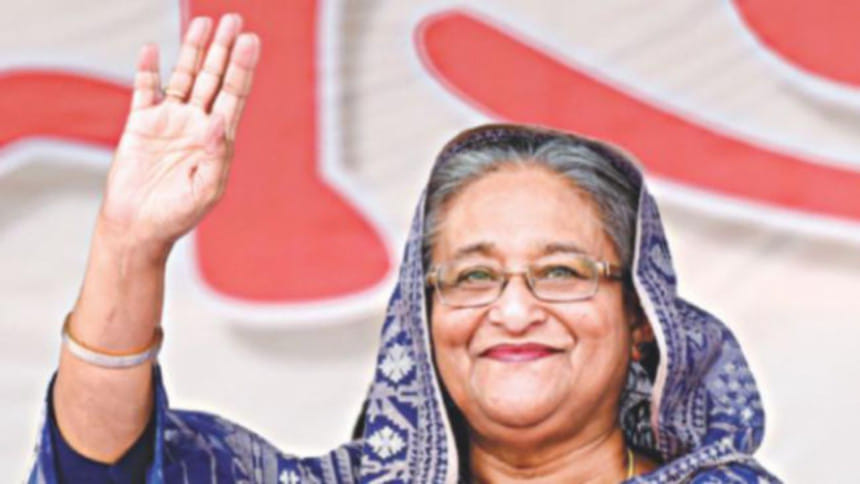Change of style or substance?

With at least 27 new faces and only a few septuagenarians around, Prime Minister Sheikh Hasina was greeted on her re-election to a record fourth term at Gono Bhaban on Tuesday.
The air, supposed to have been rent with elation, even perhaps jubilation, was anything but filled with triumphalism. The PM sounded like driving home a trifle stern message to the newly inducted ministers, state ministers, deputy ministers with the members of the AL central executive committee and party presidium members present. She told them to be "careful," for they would always be under the purview of surveillance and under her watch. "No matter what, I would get to know about it," she added on an apparently tone-setting note.
She was "grooming new leadership for the AL's future," she said, marking a relay race of changing batons in which each was required to prove equal to his/her new slot—nothing to be miffed about, the old generation yielding place to the new!
Sheikh Hasina comes across as politically astute taking a calculated risk with a bit of a rider, apparently countervailing, clause. In the first place she seemed to convey that people of her family, in the extended sense, were given nominations for election to be MPs alright; but avoided taking them into the Cabinet diluting any dynastic association. Secondly, this principle along with intent to set aside ministers who had served two terms enabled her to ease off many old guards in a blanket fashion. But let's not forget the PM commiserated with those seniors who didn't find place in the Cabinet. Recognising their services to have contributed to the uplift of Bangladesh, the PM counselled the new team to remember they have not failed.
Yet, keeping alliance partners from ministerial positions has come as a stunner, streaking a ripple in the placid water of Dhaka politics. At any rate, the AL general secretary Obaidul Quader defended party position post-haste that the alliance was not contingent upon granting ministerial slots to partners. The other old guards who have been passed over as well as the dropped alliance partners have to wait for Cabinet reshuffles down the line, a normal course of events in politics at which the AL general secretary subliminally hinted. The new entrants to ministerial portfolios, however, are no greenhorns because they have risen through a bottom-up process, and are mostly above 50 years of age. Protagonists say they bring to bear a "clean image" on the Cabinet. So if they mean business as they should, many people would like to believe they must distance themselves from sycophants, fair weather birds and pressure groups who hinder effective time management and deflect the ministerial focus on pro-people agendas.
By way of morning showing the day, the large new team, instead of riding a cavalcade of 50-60 cars to the Savar Memorial, the much-revered resting place of the Father of the Nation, used buses. Even the motorcycle ride on a pillion by a state minister who, on a correctional thought, did not forget to put on a helmet later on during the journey, would have, one hoped, marked a symbolic departure from the VIP culture that pervades our democracy. This gesture, even though symbolic, and expected to be replicated deep into the layers of governance and delivery of public services, I would venture to say, belies Milton Friedman's famous quote: "Governments never learn. Only people learn."
There are other quotes to convey public expectations.
Plato said, "Democracy is a charming form of government, full of variety and disorder, and dispensing a kind of quality to equals and unequals alike" (The Republic).
"The pleasure of serving must be exquisite if we may judge from the vast majority who are eager to be concerned with it," Voltaire mused.
David Hume, in Essays, Moral, Political and Literary, said, "Nothing appears more surprising to those who consider human affairs with a philosophical eye than the easiness with which the many are governed by the few."
Since Prime Minister Sheikh Hasina is taking a long-term view, people want her to strengthen the state institutions on the bedrock of a system of checks and balances.
Meanwhile, let's commute with relative ease and safety, be rid of violence against women and corruption, and be assured recipients of efficient service deliveries—all under the stepped-up watch of the new government. These governance issues are the closest to the hearts of the people. With the economy firmly on the trajectory of becoming the 24th largest economy of the world by 2033 to the credit of the AL government, forward-looking matching governance is the need of the hour.
Shah Husain Imam is adjunct faculty at East West University, a commentator on current affairs, and former Associate Editor, The Daily Star.
Email: [email protected]

 For all latest news, follow The Daily Star's Google News channel.
For all latest news, follow The Daily Star's Google News channel. 



Comments